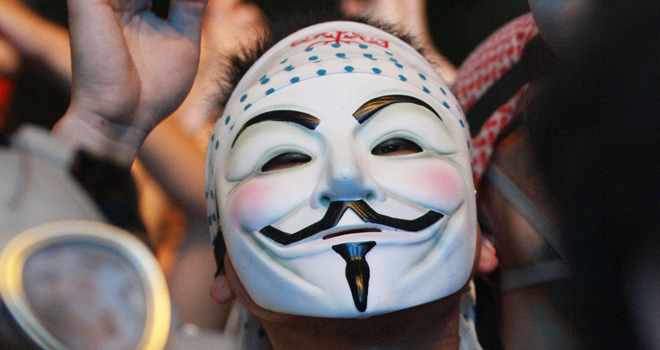It’s safe to say that San Francisco’s Bay Area Rapid Transit (BART) officials made a bad call when they temporarily cut off wireless phone service during peak travel hours at four stations earlier this month in order to to subvert a planned protest.
How bad? Bad enough to make the loose-knit hacker group Anonymous to strike back. Some of its members had participated in planning the protest against BART police for yet another fatal police shooting (this time of a homeless man) earlier this summer.
Nude photos of BART’s chief spokesman, Linton Johnson, made their way online Wednesday — apparently the result of a hacker with a bone to pick.
According to SF Weekly, the photos – which depict Johnson at a party, shirtless and pulling his shorts down to reveal his private parts alongside other shirtless men – were posted by a Twitter account linked to Anonymous. SF Weekly took down the incensed response of another BART spokesman, Jim Allison:
“They are not only unethical, but illegal,” said Allison. He went on to say that the protesters can keep demonstrating all they want, as long as it’s done legally.
“There are lawful ways to protest outside the fare gates or go to BART board meetings — that’s appropriate, not making anonymous demands,” Allison said. “We stand by our decision to interrupt cell-phone service.”
The move is just the latest in Anonymous’s campaign against BART. Earlier this week, an Anonymous blog posted a list of demands to BART and the media, among them that Johnson be fired, or else it would continue holding demonstrations at BART stations, as it has over the past two weeks.
But backing up: The specific protest BART officials were attempting to avert by cutting the cell service, which never actually ended up taking place, had been organized by the group No Justice No Bart, specifically to condemn BART police for shooting and killing 45-year-old Charles Hill on July 3, after Hill, drunk and disorderly at the time, threw a knife on a BART platform.
BART’s communications department didn’t warn anyone about the shut-down beforehand, posting an explanation online a day later when it began receiving complaints and questions. In it, BART defended the move as “as one of many tactics to ensure the safety of everyone on the platform.”
But in successfully avoiding one protest, BART, by abruptly switching off the cellular and wireless service in its stations on that fateful day, ended up inspiring a wave of demonstrations, as outraged citizens and apparent members and/or fans of Anonymous have gathered repeatedly in BART stations over the past two weeks to protest what they believe was a gross violation of civil liberties, on par with recent actions of authoritarian governments in the Middle East.
BART’s website has also been subject to several hacks, including one on August 17 that resulted in the release of identifying and contact information for BART police officers.
Three weeks after the initial disruption, what lessons has BART learned? Not much, it turns out. As the Los Angeles Times reports:
“After an emotional, three-hour hearing, members of BART’s board of directors said the policy would undergo rigorous vetting by the public and the American Civil Liberties Union.
“If we’re going to shut off cellphone service, ever, it needs to be under the most extraordinary circumstances … that I equate to 9/11 level, not the protests we thought were going to happen on Aug. 11,” said board member Lynette Sweet.
“We can no longer sit back and say: ‘We don’t like what you have to say, and we’re going to stop you from saying it.”
Come again? The prospect of shutting off wireless service during a disaster, especially one of such magnitude, seems to go utterly against what most people, including the Federally Communications Commission, would rationally recommend. If anything, the opposite should be true: one would want the most communication channels available as possible during times of crises. Responding to the disruption of cell phone service during the aftermath of the east coast earth quake this week, for instance, the FCC today told the Washington Post:
“We are very concerned by incidents where emergency wireless calls to 911 after yesterday’s earthquake were hampered by network congestion,” said FCC Public Safety & Homeland Security Bureau Chief Jamie Barnett. “Thankfully, there have been no reports thus far about serious injuries or lives lost. Nevertheless, these are the moments when mobile phone service is needed most — and disruptions puts lives at risk.”
Meanwhile, in the strongest sign yet that BART could face serve legal repercussions for its move, FCC Commissioner Robert McDowell said BART’s critics raise “very valid points.” As CNET quoted him from a tech conference in Aspen:
“What the heck happened, what precedent does it set, were there any laws that were broken?” McDowell said at a technology conference here yesterday. “Let’s continue with the investigation. We’ll draw conclusions after we have all the facts.”
Meanwhile, adding to BART’s woes comes a whole new legal argument from telecom attorney and writer Harold Feld, who says that BART, as “an instrumentality of the State of California” needed to obtain a valid permit from the state of California beforehand in order to shut down the cell service. This on top of the numerous First Amendment claims against the public transit authority.
It remains to be seen what, if any, legal consequences BART will face. But based on how they’ve responed so far, the public outcry isn’t likely to abate any time soon.
Correction: In the original version, this post misidentified the FCC Commissioner. We regret the error.









